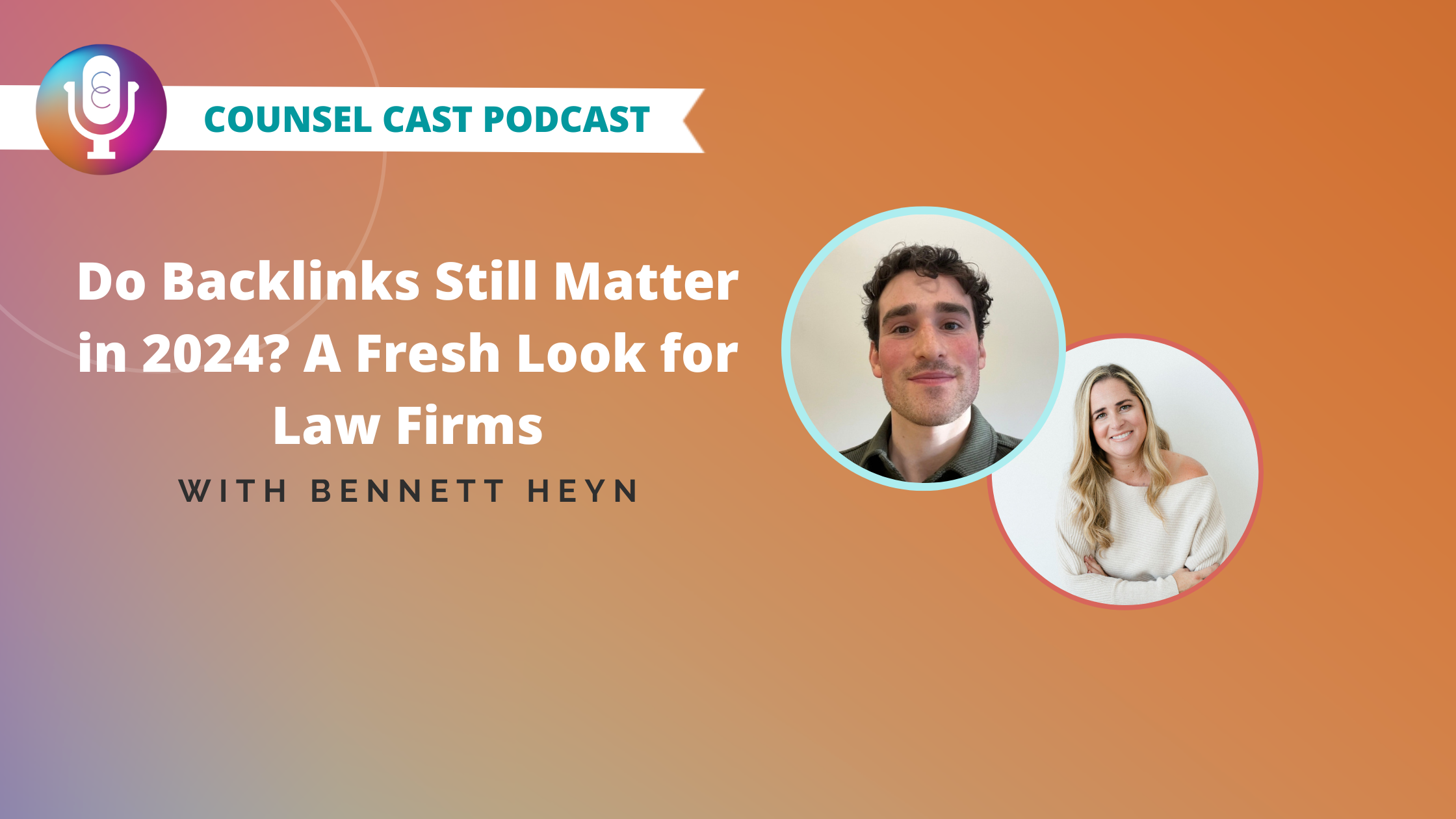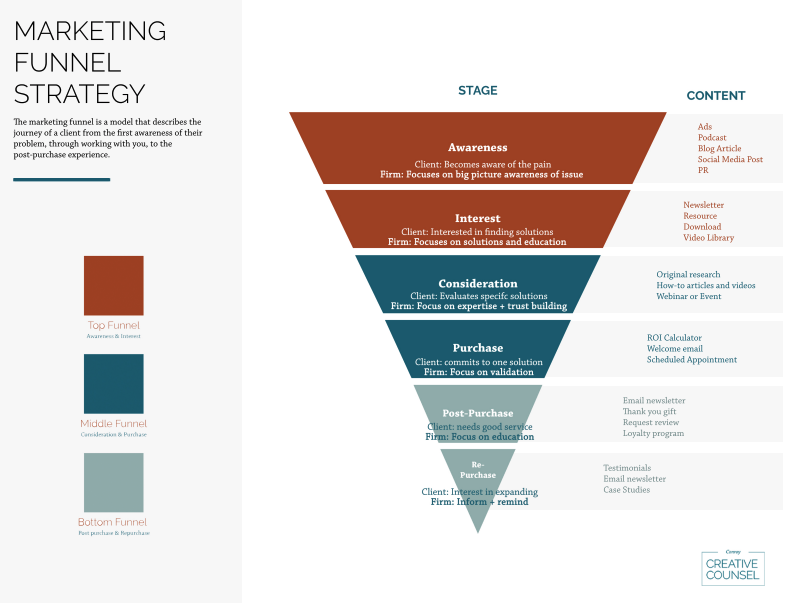In today’s digital world, having a solid online presence is a necessity, especially for professional services like law firms. However, it is no longer just about having an informative website. The evolution of the digital landscape has ushered in an era where websites and social media platforms need to work hand in hand. This integrated approach not only amplifies a law firm’s online visibility but also fosters deeper connections with current and prospective clients and peers.
In this blog, we will discuss the symbiotic relationship between a law firm’s website and its social media presence and provide actionable steps on harnessing these platforms for optimal engagement and impact. Whether your law firm is looking to expand its digital footprint, engage more effectively with your audience, or position your law firm as an industry leader, understanding how to merge the strengths of your website and social media is crucial.
We will cover the following topics:
- The Power of Integration
- Why Law Firms Struggle with Social Media Integration
- Choosing the Right Social Media Platforms for Your Law Firm
- The Advantages of Various Social Media Platforms
- Current Law Firm Social Media Trends
- Tracking and Analyzing Engagement
- Strategies to Integrate Social Media with Your Law Firm’s Website
- Potential Challenges and Solutions
- Top Tips for Law Firm Websites Using Social Media
- How Conroy Creative Counsel Can Help
#1: The Power of Integration
The digital ecosystem is vast and multifaceted, with each platform offering unique strengths. However, when a law firm’s website and its chosen social media channels operate in isolation, they often miss out on the compounded benefits of this integration. The true power of online presence emerges when these entities work in tandem.
Here, we have listed some of these benefits:
- Enhanced Visibility and Reach:
Combining the authority of a website with the extensive reach of platforms such as Facebook, X, Instagram or LinkedIn can exponentially increase a law firm’s exposure. It is like having a physical office in a premium location and also attending networking events.
- Holistic Brand Experience:
This integration ensures that current customers and prospective clients experience a consistent brand message, whether they are reading a blog post on your website or seeing an Instagram story. This unified messaging fosters trust and aids in building your law firm’s brand reputation.
- Diverse Engagement Avenues:
Whilst a good law firm website offers detailed information, testimonials, and case studies, social media platforms are engagement powerhouses. They allow for immediate feedback, discussions and personal interactions. Merging the two ensures that your audience can engage with your law firm in a manner they are most comfortable with.
- Optimized Conversion Pathways:
By integrating social media and lawyer websites, law firms can create smooth conversion pathways. For instance, a potential client might come across an informative video on a law firm’s Instagram, get redirected to a related blog post on the website, and eventually fill out a contact form or make a direct inquiry.
- Shared Content Amplification:
The best law firm websites share content across a number of platforms to ensure that it reaches a wider audience. For instance, a groundbreaking or high-profile case win highlighted on the website can be shared on LinkedIn and promoted through an X thread, amplifying its impact.
In essence, integration goes beyond merely linking one platform to another. It is about crafting a cohesive digital marketing strategy, which leads to deeper engagement, trust-building, and ultimately, business growth.
#2: Why Law Firms Struggle with Social Media Integration
The integration of social media into law firm marketing campaigns often presents challenges for a number of reasons. Here are a few:
- Professionalism vs. Casualness: Law firms aim to maintain a high level of professionalism, while social media platforms often lean towards casual and personal interactions. Striking the right balance can sometimes be tricky for any legal practice.
- Complexity of Legal Content: Legal topics are often complex and intricate and may not easily lend themselves to the brief, engaging formats popular on many social platforms.
- Client Confidentiality: The need to maintain client confidentiality and adhere to strict ethical guidelines can limit the types of interactions and content sharing on social media.
- Resource Limitations: Many law firms may lack the dedicated resources or expertise required to craft consistent, engaging social media content that aligns with their marketing, branding and message.
- Social Media Overwhelm: The rapid evolution of social media platforms, features and best practices can be overwhelming. Firms often face difficulty keeping up with the latest trends, understanding platform algorithms, and ensuring that their content remains visible and engaging. Our Counsel Cast podcast, ‘How You Can Avoid Social Media Overwhelm‘ offers some incredibly useful pointers to combat this issue.
- Audience Mismatch: Some law firms struggle to identify and target their ideal audience on social platforms, leading to mismatched content and less effective engagement.
- ROI Challenges: Measuring the direct return on investment (ROI) for social media efforts in the legal industry can be more intangible than other marketing methods, causing some firms to be hesitant about investing heavily.
In essence, while social media offers vast potential for engagement and brand building, its integration into law firm digital marketing strategies requires a nuanced approach that respects the unique challenges and considerations of the legal profession.
#3: Choosing the Right Social Media Platforms for Your Law Firm
Navigating the extensive array of social media platforms can seem like a daunting task for many law firm websites, especially when trying to decide which ones best align with your law firm’s objectives and audience. However, selecting the right platforms is pivotal in ensuring that your efforts yield optimal results.
Here’s a breakdown to guide you through the process:
✅ Identify Your Audience:
Before diving into platform selection, it is crucial to have a clear understanding of your target audience. Are there other lawyers, corporate clients, individuals needing family law assistance, personal injury law firm input, or perhaps startups looking for legal counsel? You need to:
- Understand the demographics and preferences of your target audience.
- Determine if you are targeting businesses (B2B) or individuals (B2C).
- Find out what social media platforms can bring to your legal services.
✅ Align with the Firm’s Branding:
In the digital age, consistency is key. When selecting a social media platform for your law firm, it is paramount that it reflects and reinforces your brand identity. It is not just about being present online; it is about presenting a cohesive and recognizable brand experience for potential clients and peers. You need to:
- Ensure the platform you choose matches your law firm’s tone, style and messaging.
- Avoid social media platforms that don’t resonate with your law firm’s image.
✅ Resource Consideration:
Social media, while immensely beneficial, requires a dedicated approach. Before diving headfirst into multiple platforms, law firms must introspect about their available resources. It is not just about initiating; it is about maintaining, engaging, and providing value consistently. You need to:
- Ensure you have the resources to maintain a consistent presence.
- Avoid spreading too thin across multiple platforms.
✅ Analyze and Adapt:
After selecting platforms, monitor the engagement and feedback. Over time, you will identify which platforms yield the most meaningful interactions and ROI. Be prepared to adapt, evolve, and possibly venture into new platforms as they emerge. Our excellent Counsel Cast podcast on Mastering the Right Platform offers some useful insights on this topic. You need to:
- Regularly review platform analytics to gauge engagement and reach.
- Be open to pivoting or trying new platforms based on results.
#4: The Advantages of Various Social Media Platforms
In the vast digital landscape, each social media platform brings its own set of strengths to the table. From audience demographics to content formats, understanding the unique benefits of each can empower law firms to harness them effectively.
Here is a quick breakdown of the distinct advantages of each platform, and how they can be leveraged to elevate your law firm’s online presence:
1. LinkedIn: Often regarded as the premier platform for professionals, LinkedIn is ideal for B2B connections. It is ideal for:
- Sharing thought leadership and firm achievements.
- Sharing industry news and insights.
- Networking with fellow legal professionals.
- Attracting corporate clients.
2. X (formerly known as Twitter): This microblogging platform offers a real-time pulse on trending topics and discussions. It is ideal for:
- Real-time updates and engagement with current events.
- Engaging in legal debates and sharing quick updates.
- Connecting with journalists, industry leaders and influencers.
- Sharing articles, news, and insights in bite-sized formats.
3. Facebook: While it has a broad audience, Facebook’s community and group features can be beneficial for lawyers. It is ideal for:
- Broader audience reach, including individuals and local clients.
- Utilizes features like groups for discussions and community engagement.
- Creating or joining legal discussion groups.
- Sharing longer posts, and videos, and engaging with a varied audience.
- Advertising your services, especially if catering to individuals or local clients.
4. Instagram: A visually-driven platform, Instagram can be leveraged to show a more personal side of your law firm. It is ideal for:
- Sharing behind-the-scenes content, client testimonials or event photos.
- Using Instagram Stories for time-sensitive updates or Q&A sessions.
- Highlighting significant cases, achievements or team members through visuals.
- Reaching a younger demographic with visual content.
5. TikTok: While unconventional for law firms, TikTok’s vast and engaged user base can’t be ignored. It is ideal for:
- Sharing short, informative legal tips or explaining complex legal concepts in simpler terms.
- Showcasing the lighter side of your firm with fun, relatable content.
- Engaging with younger audiences and adapting to evolving trends.
6. YouTube: Recognized as the world’s leading video-sharing platform, YouTube presents a unique opportunity for in-depth content delivery. It is an excellent choice for:
- Delivering in-depth video content, which can range from discussions on legal topics, firm introductions, client testimonials, or informative series addressing common legal questions.
- Being one of the largest search engines globally, YouTube also offers an excellent platform for SEO and increasing visibility.
In essence, the most effective social media platform for your law firm isn’t necessarily the one with the most users, but rather the one that resonates most with your target audience and aligns with your firm’s values and goals. By focusing your efforts on these platforms, you will ensure that your messages reach the right people in the most impactful way.
#5: Current Law Firm Social Media Trends
In this fast-paced digital age, social media trends are ever-evolving, and while some core strategies remain constant, the nuances of effective tactics can change.
Here are some of the latest law firm social media trends:
- Educational Video Content: With the rise of platforms like YouTube and the video features of LinkedIn, Facebook, and Instagram, many law firms have started to produce more video content. These videos often break down complex legal topics into digestible insights and offer brief, bite-sized legal tips.
- Podcasting: More law firms have entered the podcasting space, providing in-depth discussions on legal topics, interviewing industry experts, or addressing common legal queries in an informal yet educational format.
- Personalized Client Stories: Legal firms have begun to make their brands more personable by sharing success stories (while ensuring confidentiality) that resonate with potential clients on a more emotional level.
- Live video: Q&A sessions, webinars, and live streams have gained traction in recent years within the legal industry, with lawyers directly engaging with their audience, addressing queries and discussing recent legal changes.
- Thought Leadership on LinkedIn: Lawyers and law firms have been leveraging LinkedIn to publish long-form articles or posts that establish them as experts in their respective fields. Our Counsel Cast podcast, ‘How can Lawyers Leverage the Power of LinkedIn‘ offers some incredibly valuable insights on this topic.
- Utilizing Stories: The best law firm websites have utilized the shortlived nature of stories on platforms like Instagram and Facebook for time-sensitive updates, behind-the-scenes glimpses, and to promote recent publications or public appearances.
- Diversifying Platforms: While LinkedIn, Facebook, and X remain staples, some law firms have experimented with platforms like Instagram, TikTok, and even Clubhouse to reach a broader or different demographic.
- Employee Advocacy: Encouraging employees to share firm content has become more of a trend. When attorneys and staff members share firm achievements, articles or events, it extends the reach of content and adds a personal touch.
- Social Listening: Social listening is the practice of monitoring social media for conversations about your brand and industry. Law firms can use social listening to learn more about what their target audience is talking about and to identify potential leads and opportunities.
- Emphasizing DEI (Diversity, Equity and Inclusion): Many law firms have started to highlight their DEI initiatives, showcasing a commitment to diverse hiring, community outreach and inclusive practices.
- Data-Driven Decisions: The use of analytics tools to track engagement, reach and other key metrics has become standard practice. Firms are becoming savvier in adjusting their strategies based on data-driven insights.
- Authenticity and Transparency: In an age of digital scepticism, law firms are emphasizing authenticity, offering transparent insights into their values, operations and successes.
- Social Media Advertising: Social media advertising can be a great way for law firms to reach a larger audience and generate leads. Law firms can use social media advertising to target specific demographics and interests.
While these trends offer a snapshot of the strategies being employed, it is essential for law firms to not just follow trends but to assess which ones align with their brand, values and target audience before diving in.
#6: Tracking and Analyzing Engagement
For law firms investing time and resources into social media, it is paramount to understand the effectiveness of their efforts. Tracking and analyzing engagement is crucial not only to justify the investment but also to refine and optimize strategies.
Here are some key insights:
- Define Key Metrics: Depending on the platform and your goals, this could be likes, shares, comments, click-through rates, conversion rates or new followers.
- Use Built-in Analytics Tools: Platforms like Facebook, X, LinkedIn and Instagram offer their own analytics dashboards. Familiarize yourself with these tools to gain insights into post performance, audience demographics, and peak engagement times.
- Leverage Third-Party Tools: Tools like Hootsuite, Buffer, or Sprout Social can help consolidate analytics from various platforms, providing a holistic view.
- Set Benchmarks: Determine what success looks like for your firm. This could be based on past performance or industry averages. Knowing this will help you measure progress more effectively.
- Evaluate Content Performance: Identify which types of content resonate most with your audience. For instance, do they prefer video content, blog post links or interactive polls?
- Monitor Engagement Trends: Are there specific times or days when your audience is more active? This can inform you when you schedule posts for maximum visibility.
- Assess Audience Growth: While gaining followers is a positive sign, also consider the quality and relevance of these followers. It is more beneficial to have a smaller, engaged audience than a larger, passive one.
- Track Conversion: If one of your goals is to drive traffic to your website or encourage potential clients to contact you, monitor conversion metrics closely. Tools like Google Analytics can help track referrals from social media.
- Feedback Loop: Engage directly with your audience to gather feedback. What would they like to see more of? Are there areas of improvement?
- Continuous Learning: Social media is dynamic, and what works today might not be as effective tomorrow. Be open to testing new content formats, posting times and engagement strategies.
- Competitor Analysis: Keep an eye on what competitors or similar firms are doing. Their successes and failures can offer valuable insights.
- Adjust and Refine: Based on your analysis, continuously adjust your strategy. Whether it’s posting frequency, content type, or engagement tactics, be flexible in your approach.
By tracking and analyzing engagement meticulously, law firms can ensure they get the best return on their social media investments, continuously improving their strategy for optimal results.
#7: Strategies to Integrate Social Media with Your Law Firm’s Website
Creating a harmonious synergy between your law firm’s website and social media platforms is more than just posting links or sharing content. Effective integration requires a strategic approach that amplifies the strengths of each platform while fostering a seamless user experience.
Here are some strategies to help your attorney website integrate effectively:
✅ Embed Social Media Feeds on Your Website:
- This provides real-time updates, showcases your active online presence, and can potentially increase your social media followers.
- Utilize widgets or plugins that allow feeds from platforms like X, Instagram, or Facebook to appear directly on your site, particularly on the homepage or a dedicated ‘News & Updates’ page.
✅ Use Social Media Share and Follow Buttons:
- This enables visitors to easily share your website content, broadening its reach and potentially driving new traffic to your site.
- Incorporate share buttons on blog posts, case studies, and other relevant pages. Ensure your law firm’s social media profiles are easily accessible via prominent ‘Follow’ buttons.
✅ Cross-Promotion:
- This maximizes the visibility of content and ensures that your audience on one platform is aware of your presence on another.
- Share your website’s blog posts, case studies, or news on social media with compelling captions. Conversely, tease upcoming website content or events on social media to drive traffic back to the site.
✅ Consistent Branding and Messaging:
- This presents a unified brand image, which fosters trust and increases brand recall.
- Ensure logos, brand colors, tone of voice, and key messages are consistent across your website and all social media platforms.
✅ Direct Engagement with Audience:
- This facilitates relationship-building, showcases your expertise, and makes your law firm more relatable.
- Use social media platforms for Q&A sessions, webinars, or live discussions related to your practice areas. Drive participants to sign up or learn more via your website.
✅ Leverage User-Generated Content (UGC):
- This enhances authenticity and builds trust. UGC can often resonate more with potential clients than polished marketing messages.
- Encourage satisfied clients (where appropriate and without breaching confidentiality) to share their experiences on social media. Feature select testimonials or stories on your website with due permission.
✅ Integrate Social Media in Newsletters:
- This increases the chances of your email subscribers engaging with you on social media.
- Add social media icons in your email footers and consider highlighting standout social posts within the newsletter content.
In implementing these strategies, always remember the importance of two-way communication. While driving social media followers to your website is valuable, guiding website visitors to your social platforms is equally crucial. This dual approach ensures a more comprehensive and engaging online presence, setting the stage for sustained growth and client relationships.
#8: Potential Challenges and Solutions
Even with the best strategies in place, law firms might encounter challenges when integrating social media into their marketing efforts. Recognizing these challenges and proactively addressing them is essential for success.
Here are some of the most common challenges and solutions to overcome them:
✅ Maintaining Professionalism:
- Within your digital marketing strategy, your law firm must develop a clear content guideline that emphasizes your firm’s tone and style and train team members on best practices and social media etiquette.
✅ Navigating Ethical Boundaries:
- Law firms must familiarize themselves with the state bar or relevant legal association’s guidelines on advertising and social media. They must always avoid giving specific legal advice online and ensure confidentiality is maintained at all times.
✅ Resource Limitations:
- Consider using social media scheduling tools or hiring dedicated staff or agencies, such as Conroy Creative Counsel, who have specialist knowledge and experience in strategic legal marketing. It is also useful to prioritize platforms that yield the best engagement.
✅ Content Creation Burnout:
- Creating content can be a tedious and repetitive task. Planning a content calendar in advance, repurposing content across platforms and exploring various content forms, from blog post summaries to video snippets can be helpful.
✅ Negative Feedback or Reviews:
- These are unavoidable but make sure you always respond professionally and promptly to any negative comments. Consider taking detailed discussions offline and implementing reputation management strategies.
✅ Keeping Up with Platform Updates and Trends:
- It is important to dedicate time to continuous learning. Follow industry leaders, attend webinars, or consider short courses on social media marketing. For more social media trends and insights in the legal industry listen to our podcast, ‘What are the Current Social Media Trends‘.
✅ Measuring ROI:
- Establish clear objectives and key performance indicators (KPIs) in your marketing strategy from the outset. Use analytics tools and regularly assess performance against these benchmarks.
✅ Audience Engagement Plateaus:
- Refresh your content strategy to avoid audience plateaus. Host Q&A sessions, webinars, or polls to re-engage your audience. Also, consider collaborations or partnerships to expand reach.
✅ Data Privacy Concerns:
- Familiarize yourself with data protection regulations like GDPR or CCPA. Ensure that any data collected through social media is stored and used compliantly.
✅ Crisis Management:
- Have a crisis communication plan in place. In the event of a PR crisis or major mistake, respond quickly, transparently and professionally.
✅ Determining Ad Spend Efficiency
- Start with small, targeted marketing ad campaigns to test effectiveness. Adjust this based on performance analytics and optimize for better cost-per-acquisition rates.
By understanding the potential challenges legal services may face and proactively seeking solutions, law firms can navigate the complex world of social media more confidently and effectively.
#9: Top Tips for Law Firm Websites Using Social Media
Navigating the social media realm as a law firm can be uniquely challenging, given the professional nature and nuances of the legal industry. However, with the right strategies and insights, it can be a game-changer for client engagement and brand visibility.
By integrating the following tips into their social media strategy, law firms can enhance their online presence, engage more effectively with their audience, and foster a trusted brand image.
- Be Authentic and Genuine: Ensure your content is genuine and reflective of your law firm’s ethos, as discerning audiences value and recognize sincerity in online interactions.
- Be Consistent: Avoid sporadic postings followed by prolonged silences. Instead, establish a regular posting schedule, even if it entails sharing content as infrequently as once a week.
- Be Visual: People are more likely to engage with content that includes images and videos.
- Be Interactive: Don’t just post content and then disappear. Respond to comments and questions from your audience.
- Use Social Media Listening: Use social media listening to learn more about your target audience and to identify potential leads and opportunities.
- Professionalism First: Ensure that your content, responses, and engagements maintain a high level of professionalism befitting your law firm.
- Engage, Don’t Just Broadcast: Interact with followers, answer questions, and join relevant discussions. Engagement can help humanize your brand and foster trust.
- Quality Over Quantity: It is better to post meaningful, well-thought-out content occasionally than to post frequently with little substance.
- Stay Ethical: Be cautious not to share confidential information, give specific legal advice, or make misleading claims.
- Educate Your Audience: Break down complex legal concepts into digestible content. This positions your law firm as a knowledgeable resource.
- Stay Current: Comment on recent legal developments or news related to your area of practice.
- Showcase Your Firm’s Culture: Share behind-the-scenes moments, team events, or community outreach activities to personalize your brand.
- Use Platform-Specific Strategies: Understand the nuances of each platform and tailor your content strategy accordingly.
- Promote Client Testimonials: With clients’ permission, share their positive experiences to build credibility.
- Avoid Controversial Topics: Be cautious when engaging with politically charged or highly controversial subjects unless they directly relate to your area of expertise.
- Utilize Paid Advertising: Consider using paid social ads for targeted campaigns, events or when launching new services.
- Consistent Branding: Ensure a consistent brand voice, look and feel across all platforms to create a recognizable digital identity.
- Stay Updated with Platform Changes: Social media platforms frequently update their algorithms and features. Stay informed to maximize your reach and engagement.
How Conroy Creative Counsel Can Help
In today’s digital landscape, integrating social media into a law firm’s marketing strategy has become an essential component. We at Conroy Creative Counsel, with our specialized focus on legal professionals, offer a tailored approach to this integration. Leveraging our expertise ensures that law firms not only establish a solid online presence but also engage meaningfully with their target audience.
Here’s how we can help your law firm thrive:
- Comprehensive Strategy Development: We specialize in creating tailored marketing strategies for law firms. With our expertise, we can craft a holistic social media strategy that aligns with your law firm’s specific goals and target audience.
- Website Design and Integration: We offer innovative website design services for legal professionals. We design websites with integrated social media functionalities, ensuring seamless user experience and maximum engagement.
- Content Creation: Content is a forte of Conroy Creative Counsel, specially tailored for law professionals. We generate engaging, shareable content for social media that resonates with potential clients and establishes the firm’s thought leadership.
- SEO & Online Advertising: We understand the nuances of Search Engine Optimization and online advertising. We can help to boost your law firm’s visibility on social media platforms using optimized content and targeted ad campaigns.
- Branding Services: We offer a comprehensive branding service and we ensure that your law firm’s branding is consistently reflected across all social media channels, enhancing recognition and trust.
- Consultation and Training: Our agency isn’t just about providing services; we also educate and offer consultations. Receive expert guidance on best practices for social media engagement and effective marketing strategies for the legal sector and stay updated on evolving trends.
- Data Analysis and Reporting: Measuring success is crucial, and we at Conroy Creative Counsel understand this. We provide regular reports on social media performance, enabling your firm to understand ROI and make informed strategy adjustments.
- Ongoing Support: We pride ourselves on integrity and professionalism, and we offer continued support and advice to our clients. As your firm grows and evolves, we will be there to adapt and refine your marketing and social media strategy, ensuring sustained success.
By leveraging the multifaceted expertise of Conroy Creative Counsel, law firms can effectively navigate the complexities of social media integration and harness its vast potential for marketing success.
Contact Us Today
Navigating the intricacies of a digital presence for law firms requires a keen understanding of both the legal and digital landscape. At Conroy Creative Counsel, we are experts in bridging this gap. Whether you are considering an overhaul of your current website, contemplating a fresh design, or aiming to augment mobile responsiveness, we are here to guide you.
With our expertise, we can help you create a digital presence that not only echoes the aspirations of your law firm but also appeals to the modern, tech-informed clientele.
Contact us today and take the first step towards creating a social media presence that resonates with your audience and aligns with your law firm’s goals.





















